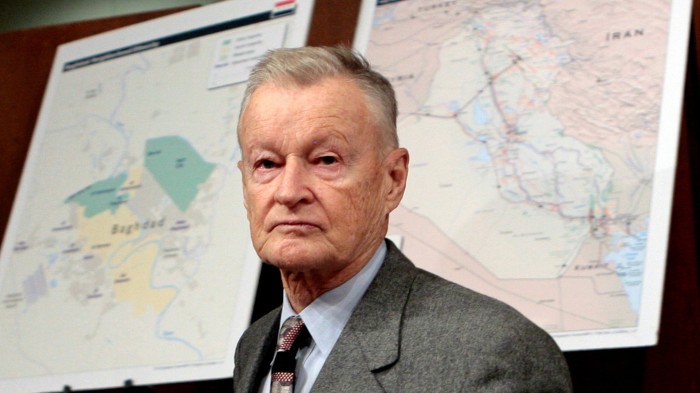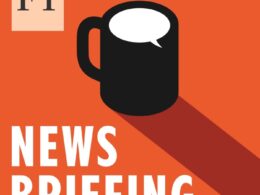“History is bunk”, Henry Ford is alleged to have said. One can easily imagine Donald Trump saying the same thing. With the exception of Russia’s Vladimir Putin, who pores over czarist maps in search of land grabbing pretexts, those with authoritarian impulses tend to revile scholarship, including history.
As Swampians might by now be tired of hearing, my biography of Zbigniew Brzezinski (Zbig: The life of Zbigniew Brzezinski, America’s Great Power Prophet) is published next Tuesday, May 13. I began this mammoth research project during Covid. At weekends, in the evenings, on vacation, and during several leaves of absence from the FT, I have immersed myself in the lengthiest research of my life so far, and the most intellectually enriching.
Astonishingly, my marriage survived and my daughter does not hate me. But my wife, Niamh King, without whom I could not have done this, often joked that there were three people in our marriage. You have to be a little obsessed to write a biography. She used to quip that whenever she asked me to pass the salt, I would ask “SALT I or SALT II?”, referring to the 1970s Strategic Arms Limitation Treaties. I didn’t but she was not far wrong. But now the book, which was own private Idaho for five years, is in the hands of others. And I must convince people that the story of an American grand strategist who died eight years ago is relevant to today. Here is my case.
The present is child of the past. Without knowledge of how we got here, we are Trumpian orphans shaking our fists at the world we do not understand. Brzezinski, like his fellow immigrant scholar-practitioner, Henry Kissinger, and George Kennan, America’s original great cold war thinker, was a student of history and a scholar of America’s adversaries. His knowledge of Russia, and the Soviet Union, was almost as great as his ignorance of Iran, which proved to be his — and president Jimmy Carter’s — nemesis.
As the Miami property developer, Steve Witkoff, jumps from Moscow to Riyadh in search of deals to solve the world’s thorniest problems, it is hard to avoid the contrast between today’s ignorance and yesterday’s knowledge. Marco Rubio, who now has the unexpected distinction of being the first person since Kissinger to be both secretary of state and White House national security adviser, is far better informed than Witkoff. But he got the job by playing Greek chorus to whatever Trump says, even if it is the opposite by dinner time to what it was at breakfast. A yes man cannot be a strategist. But as Kissinger quipped about himself, the secretary of state and national security adviser are now likely to get along with each other. Mike Waltz, Trump’s first national security adviser, who has been banished to the Siberian exile of the UN, had disagreed with Trump over Iran and Russia.
Brzezinski was intimately knowledgeable about America’s cold war adversary. As he had forecast, and had helped sow the seeds during the Carter years, the USSR collapsed under the weight of its ossification eight years after Carter left office. In a piece for Time magazine under the headline, “Vindication of a hardliner”, Strobe Talbott explained how everything Brzezinski had predicted and tried to facilitate had come to pass with the demise of the Bolshevik empire.
Those years following the collapse of the Berlin Wall were the moment of peak US triumphalism. Instead of joining America’s prolonged ovation to itself and to liberal capitalist democracy, Brzezinski wrote a book, Out of Control, forecasting why the US would be undone by its hubris. He argued that America was developing a one-size-fits-all toolkit that was serenely ignorant of the audience for which it was meant. Unipolar America did not feel it needed to study the world: quite the contrary, the world must study America. Brzezinski forecast that the US would inadvertently spawn an “alliance of the aggrieved” that would include Russia, China, Iran and others resentful powers that felt they were on the losing side of history. It was a cacophonous message in 1993. It was also prophetic.
Now we are dealing with the consequences of an America that gave up grand strategy more than three decades ago. To master the multi-polar, unstable, ever-shifting new global landscape — known by some as the “revenge of geopolitics” — we must relearn the lesson that knowledge is power. Trump 2.0 is peak US ignorance. Today especially is a good time to understand how we got here and what we are missing. I should underline that this is no hagiography. Like Kissinger, Brzezinski got plenty wrong. But he studied and engaged with the world in a relentless itinerary that is exhausting simply to chronicle. He died in May 2017 just a few months into Trump’s first presidency. He had been born into a privileged Warsaw family in 1928, the year that Stalin consolidated power. That is where my book begins.
Thank you to any Swampians who want to pre-order my book.
I am turning this week to Jonathan Derbyshire, my New York-based colleague, who is the FT’s US opinion editor. Jonathan, I’m sorry to inflict my extracurricular musings on you. It won’t happen again. As a philosopher by training, you are exceptionally well placed to answer the following question: what is the best case for studying history? Am I overstating its value?
Recommended reading
-
My column this week looked at Elon Musk’s painful exit from Washington. I do not know what will happen to his so-called department of government efficiency. But I conclude that if there is such a thing as a chainsaw that boomerangs, Musk invented it.
-
I was in London this week for Tina Brown’s Truth Tellers conference, which she set up in memory of her late husband, Sir Harold Evans, the storied editor of the Sunday Times, and pioneering investigative journalist. While there, I had a really absorbing podcast conversation with “The Two Matts” — Matthew D’Ancona and Matt Kelley of the New European — on Zbig and the revenge of geopolitics.
-
And talking of the revenge of geopolitics, do read this cool-headed analysis of the current Indo-Pakistani security crisis by my ex-colleague Farhan Bokhari, formerly the FT’s Pakistan correspondent.
-
Finally, if you happen to be in Washington DC this Saturday, consider dropping into the FT Weekend Festival at the Kennedy Center, where I’ll be in (no doubt contentious) conversation with Donald Trump’s former chief strategist and avowed enemy of “globalism”, Steve Bannon. Other speakers include my colleagues Roula Khalaf, editor of the FT, and columnist Gillian Tett, as well as Peter Mandelson, the UK’s ambassador in Washington, who’ll no doubt be keen to spill the beans on the trade deal Britain has just struck with the US.
Jonathan Derbyshire responds
Thanks, Ed. I remain in awe of your ability to write a weekly column while composing your magnum opus, which I can’t wait to read.
As for your question, I’ve never studied history formally, though the 19th-century German thinker Hegel, with whom I suspect Brzezinski would have been familiar, did say that philosophy, my old academic discipline, is its own time apprehended in thought. Which strikes me as also not a bad description — a self-flattering one, at any rate — of the trade you and I now both practice.
But perhaps the best philosophical case for the study of history comes not from Hegel but from his predecessor, Leibniz, who famously wrote that “the present is saturated with the past and pregnant with the future”. And if he was right about that, then wilful historical ignorance of the sort you see in the Trump administration is worse than idle.
I wonder, though, if it is in fact a besetting temptation for great powers and their emissaries, at least in their decadent phase, to believe not only that they shape history, rather than are shaped by it, but that they can leave it behind altogether? And we know what comes after such hubris.
Your feedback
We’d love to hear from you. You can email the team on swampnotes@ft.com, contact Ed on edward.luce@ft.com and Jonathan on jonathan.derbyshire@ft.com, and follow them on X at @jderbyshire and @EdwardGLuce. We may feature an excerpt of your response in the next newsletter
Source link









